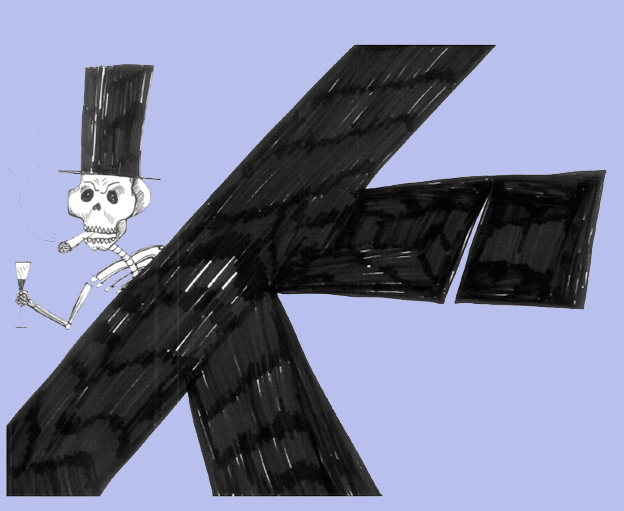KONZUMING
Approaching the supermarket she heard a strange sound.
Something like the rippling and grating of a gigantic metal surface. A powerful southerly had been blowing since the night before. The parking lot was sweltering and deserted, strange even for mid-August. The intense heat and high-pressure air had seared the asphalt, and pockets of the surrounding vegetation had turned a burnt, black-brown color. It was Sunday afternoon and the color of the sky was changing to gray. The neighborhood was encircled by a wall of leaden-blue clouds from the west. Droves of shopping carts formed a large metallic snake at the fore of the parking lot, where a lone old man was sitting on the patio of the attached outdoor café. He looked like a wax figure of Pope Ratzinger with sunglasses. He was completely still. The wind made an eerie sound as it hit the metal blocks. Raising her head in search of its source, she saw the enormous first letter of the word KONZUM tottering precariously above her. She was startled out of her hypnotic gaze when two arms encircled her waist tightly from behind. Out of nowhere a large plush mask appeared right in front of her face. It looked like an elephant and a mutated insect put together. The mask was followed by two young women. They were giggling and taking pictures of her with their cell phones while the monstrosity rubbed up against her with its giant plush antennae. I’m a sqeeter, uttered a voice behind the mask. ZZZZZZZZ. I’m an old geezer. He refused to let her go. The two girls, in a fit of hysterical laughter, shoved two promotional samples of Autan insect repellant into her hands. The geezer-sqeeter kept pricking her torso with its thick stuffed snout, which hung from its head like an elongated nose. She felt totally disoriented in the midst of the ambush. The man lasciviously poked her with his snout, while the girls riled him on, ooo you reeeally stung her now, you really stuuung her, and doubled over with laughter. She hastily tore herself out of that sudden promotional assault, threw the samples of Autan on the ground, and rushed toward the store, its open doors welcoming her like a life raft. The monstrosities remained on the other side of the door. Through the glass, she watched their grimaces and convulsions like scenes from a silent horror film.
The supermarket was empty and cold as a grave. The usual advertising jingles—“Because you deserve it” and other tame melodies—were inaudible, as was the beeping of barcode scanners. At the entrance stood a cardboard cutout of a smiling Konzum mannequin with slightly larger-than-human dimensions. Below the cardboard man were the words: Konzum—with you through life, and next to him, a semi-faded sign that read: Konzum—the Croatian word for supermarket. The only other living thing in the entire store was a single cashier—a woman on the stockier side, with wavy blond hair, and barely taller than the cash register in front of her. She was holding a small bar of chocolate and preparing to take a bite.
She didn’t notice anyone else entering the store. She directed her gaze toward the ceiling, where the aisle markers were hanging on chains and lightly swaying. Meat, Dairy, Cleaning Supplies, Bakery, Beverages. She picked up a smaller red basket; she didn’t intend to buy much, just a few essentials to hold her over until the next day. Yogurt, milk, some pastries. She looked around, hoping to see other shoppers. The floor was dirty, covered with litter and footprints—like they hadn’t cleaned it for days. The shelves didn’t sport their usual abundance. Many products were on sale because of their imminent expiration date. There were no fresh fruits or vegetables, aside from blackened bananas and one soft and wrinkled cucumber. The Agrokor retail conglomerate was struggling to stay afloat, even though this was the only grocery store in the neighborhood. With all its former splendor, Konzum was going the way of the long-vanquished Diona, Slavija, and Union stores. Their shelves had gaped empty as though ahead of an impending cataclysm, before the stores closed for good. Here, too, only books remained plentiful on the rotating displays in front of the checkout lanes. They gleamed in their glossy plastic wrappers, some with a promotional gift—sunscreen lotion or a packet of instant coffee.
As she walked along the rows of empty shelves, she felt uneasy. She hoped at least one other person might be here, not counting the cashier and herself. Every now and then she’d glance between the aisles toward the cash registers. The cashier had hardly moved and was so motionless that she looked from a distance like a St. Nikola chocolate figurine in its red-and-green wrapper. In fact, the cashier seemed to be chomping down on just the one. An entire candy aisle was filled with those chocolates, left over from the holiday season—various Santa Clauses and Easter Bunnies trademarked by Milka and Lindt, reindeer, eggs, and chicks. She was heading in the direction of the bakery when she heard a sudden noise. A man in a red Konzum uniform with a cart full of beverages passed in front of her. He was starkly thin and bony, barely a pale shadow of the cardboard mannequin. He anxiously heaved the beverages like an ant with an oversized load and nearly knocked her down with the overburdened cart. At the last moment, she stepped back, in the direction of a fridge filled with cured meats. She paused in front of the fridge. It too had surprisingly little to offer. Just a few factory-sealed packages of prosciutto, mortadella, and ham. Overcast with shades of gray and brown, the squashed pieces of meat had not a hint of the appetizing bright pink color shown on their packaging. Most were plastered with yellow labels that said CLEARANCE in red letters. She stared at the meat as if they were clues to a mystery. She paused. She stroked the packages of squashed meat.
She was startled out of her thoughts by a trembling voice whispering to her: – I see you like munching meaty treats? – It was the old man she had seen in the café outside the store. How had she failed to see him enter the store and approach her? He had on an unbuttoned shirt and tinted glasses. She didn’t want to stare, but she thought his fly was open. She remained frozen in place. And then he asked her: – And do you like granddaddies?
Feeling as if she’d just been slapped in the face, she headed in the direction of the dairy aisle. The old man moved slowly and feebly. She shoved a fruit yogurt into the basket and took a carton of unrefrigerated Tetra-Pak milk from the stack. She only needed to grab some bread and then she’d get out of this rotten place. The silence in the store was abruptly interrupted by a turbo-folk song, which sounded like it was being played on someone’s phone. She soon heard humming, too. A young man she recognized from around the neighborhood had entered the store. He looked about eighteen and spent most of his time out on the street. He often turned people’s heads by belting some song on one of the benches in the park or shouting at passersby. She suddenly heard the music stop. The young man cursed his phone and the battery. She’d almost reached the bakery department. The young man, who wasn’t in her line of sight, periodically shouted something. Screw this or that thing, motherfucking noodles, coffee, frying pans, and on and on, with every item that was out of stock. He mentioned the head of Konzum last: fucking Todorić, screw that thieving fucker. From his voice, she could tell how far away he was. Then he began to hum what she presumed was another turbo-folk melody. At first so quietly that she couldn’t make out the words, then more and more loudly. His voice echoed throughout the store. Kon-zu-ming, Shit-ting, Ex-pi-ring, we’re livestock ready for a-slaughtering! She stood in the bakery department while the voice of the young man drew closer and closer to her. Kon-zu-ming, Shit-ting, Ex-pi-ring. In the bakery, there wasn’t a living soul. There were no fresh pastries, no bread. Only a few vacuum-sealed American toasted loaves with long shelf lives. Kon-zu-ming, Shit-ting, Ex-pi-ring. She waited at the counter, hoping someone would appear. The young man was getting closer and closer—he’d spotted her now and was heading straight towards her. Kon-zu-ming, Shit-ting, Ex-pi-ring. She stood motionless at the counter. The young man stopped humming and walked right up to her. She could feel his breath. He smelled like cigarettes and neglect. She turned and looked into his eyes. The whites were streaked with tiny red lightning bolts. His face looked strangely bloated. They stood there, side by side, in tense silence. All of a sudden, an eruption of noise—of glass bottles, at the other end of the store. She shuddered. She broke into a run in the direction of the checkout. The aisle markers above her began to sway. At the checkout, the cashier was gone. She heard only a voice that asked her if she had a Multiplus discount card. She looked around in wonder for the source of that faint female voice. It seemed to be coming from a pile of chocolate crumbs on a red-and-green wrapper lying on the counter.

Translator’s Note:
Dear Pests and Other Creepy Stories (Poštovani kukci i druge jezive priče), published by Profil Knjiga in 2019, is a short story collection by acclaimed Croatian writer Maša Kolanović. The twelve stories dramatize the creeping spread of capitalism in contemporary Eastern Europe. Woven together through the metaphor of cockroaches and other “pests”, the stories expose the absurd and sinister facets of otherwise familiar situations—like going to IKEA, signing up for a phone plan, or vacationing on the beach. The stories move from the aggressively gentrified Adriatic coast (hyped as the setting for Game of Thrones) to Zagreb’s socialist-era high-rises (home to many of Kolanović’s characters) and its metropolitan outskirts (where refugees are detained from entering “Europe proper”).
Alongside “Unending” (story #7) (which appeared in Asymptote) and “Dolls from Chernobyl” (story #8) (which appeared in Two Lines Journal, in Vlad Beronja’s translation), the story published here—“Konzuming” (story #10)—offers a nightmarish sketch of the mega-chain grocery store Konzum, where a young woman confronts an onslaught of sexualized brand advertisements and factory-sealed packages of processed foods. Since late-capitalist forms of empire weaponize bad poetry, the story’s violence unfolds to the accompaniment of cutesy jingles and catchy slogans. This soundtrack not only poses a significant translational challenge—in late-capitalist terms, an exponential one!—but also reveals the story’s global reach in an era of privatization and hyper-concentrated wealth.
“Konzuming” explicitly names Ivica Todorić, the once-CEO of Agrokor, which he would later transform into the joint stock company Konzum. Serving as a leading player in 1990s privatization processes, Todorić came to monopolize the retail industry, becoming one of the wealthiest men in the region. As its acquisitions billowed beyond manageability and private pockets were more readily lined than store shelves, the company was forfeited to the Croatian government. While federal authorities charged Todorić with embezzlement, those charges were later dropped. Kolanović’s story bravely bears witness to this recent history.

Maša Kolanović is an award-winning author best known for her genre-bending works of fiction and poetry. Her books include the poetry collection Pijavice za usamljene (Leeches for the Lonely, 2001), the novel Sloboština Barbie (Underground Barbie, 2008), the prose poem Jamerika (2013), and the short story collection Poštovani kukci i druge jezive priče (Dear Pests and Other Creepy Stories, 2019). The latter received the 2020 EU Prize for Literature, the Pula Book Fair Audience Award, and the Vladimir Nazor Prize for Literature. She is an associate professor in the Department of Croatian Studies at the University of Zagreb.

Ena Selimović is a Yugoslav-American writer and co-founder of Turkoslavia, a translation collective and journal. Her work has appeared in Words Without Borders, Los Angeles Review of Books, The Dial, and World Literature Today, among others, and has received support from the American Literary Translators Association, the American Council of Learned Societies, and the National Endowment for the Arts. She holds a PhD in comparative literature from Washington University in St. Louis.

 BACK TO ISSUE
BACK TO ISSUE